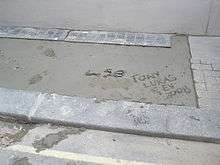Definify.com
Webster 1913 Edition
Cement
Ce-ment′
(sĕ-mĕnt′ or sĕm′ĕnt)
, Noun.
[OF.
cement
, ciment
, F. ciment
, fr. L. caementum
a rough, unhewn stone, pieces or chips of marble, from which mortar was made, contr. fr. caedimentum
, fr. caedere
to cut, prob. akin to scindere
to cleave, and to E. shed
, v. t.] 1.
Any substance used for making bodies adhere to each other, as mortar, glue, etc.
2.
A kind of calcined limestone, or a calcined mixture of clay and lime, for making mortar which will harden under water.
3.
The powder used in cementation. See , 2.
Cementation
, Noun.
4.
Bond of union; that which unites firmly, as persons in friendship, or men in society.
“The cement of our love.”5.
(Anat.)
The layer of bone investing the root and neck of a tooth; – called also
cementum
. Hydraulic cement
. See under
Hydraulic
.Ce-ment′
,Verb.
T.
[
imp. & p. p.
Cemented
; p. pr. & vb. n.
Cementing
.] 1.
To unite or cause to adhere by means of a cement.
Bp. Burnet.
2.
To unite firmly or closely.
Shak.
3.
To overlay or coat with cement;
as, to
. cement
a cellar bottomCe-ment′
,Verb.
I.
To become cemented or firmly united; to cohere.
S. Sharp.
Webster 1828 Edition
Cement
CEMENT
,Noun.
1.
Any glutinous or other substance capable of uniting bodies in close cohesion, as mortar, glue, soder, &c. In building, cement denotes a stronger kind of mortar than that which is ordinarily used. 2.
Bond of union; that which unites firmly, as persons in friendship, or men in society.3.
Powders or pastes, surrounding bodies in pots and crucibles, for chimical purposes.CEMENT
,Verb.
T.
2.
To unite firmly or closely; as, to cement all parts of the community; to cement friendship.CEMENT
,Verb.
T.
Definition 2026
Cement
cement
cement
See also: Cement
English
Workers in Iraq using a cement mixer to make cement (sense 2)
Bags of cement (sense 1) used for building construction in Tunisia

Alternative forms
- cæment (archaic)
Noun
cement (countable and uncountable, plural cements)
- (countable, uncountable) A powdered substance that develops strong adhesive properties when mixed with water.
- 1918, W[illiam] B[abington] Maxwell, chapter 22, in The Mirror and the Lamp, London; New York, NY.: Cassell, OCLC 4293073, OL 1097634W:
- In the autumn there was a row at some cement works about the unskilled labour men. A union had just been started for them and all but a few joined. One of these blacklegs was laid for by a picket and knocked out of time.
-
- (uncountable) The paste-like substance resulting from mixing such a powder with water, or the rock-like substance that forms when it dries.
- (uncountable) Any material with strong adhesive properties.
- (figuratively) A bond of union; that which unites firmly, as persons in friendship or in society.
- the cement of our love
- (anatomy) The layer of bone investing the root and neck of a tooth; cementum.
Derived terms
Translations
a powdered substance
|
|
the paste-like substance
|
|
any material with strong adhesive properties
See also
Verb
cement (third-person singular simple present cements, present participle cementing, simple past and past participle cemented)
- (transitive) To affix with cement.
- (transitive) To overlay or coat with cement.
- to cement a cellar floor
- (transitive, figuratively) To unite firmly or closely.
- c. 1606, William Shakespeare, Antony and Cleopatra, Act II, Scene 1,
- For they have entertained cause enough
- To draw their swords: but how the fear of us
- May cement their divisions and bind up
- The petty difference, we yet not know.
- 1840, John Dunlop, The Universal Tendency to Association in Mankind. Analyzed and Illustrated, London: Houlston and Stoneman, page 103:
- Olympic Games. — Besides the ordinary confederacies that join independent states together, a singular federal bond is remarkable in the Olympic games, which for many ages cemented the Grecian commonwealths by a joint tie of recreation and religious ritual.
- c. 1606, William Shakespeare, Antony and Cleopatra, Act II, Scene 1,
- (figuratively) To make permanent.
- 1758, David Hume, “Essay XXII. Of Polygamy and Divorces.”, in Essays and Treatises on Several Subjects, new edition, London: Printed for A[ndrew] Millar, in the Strand; and A. Kincaid and A. Donaldson, at Edinburgh, OCLC 912916757, page 115:
- But friendſhip is a calm and ſedate affection, conducted by reaſon and cemented by habit; ſpringing from long acquaintance and mutual obligations; without jealouſies or fears; and without thoſe feveriſh fits of heat and cold, which cauſe ſuch an agreeable torment in the amorous paſſion.
- 2016 March 27, Daniel Taylor, “Eric Dier seals England’s stunning comeback against Germany”, in The Guardian, London, archived from the original on 22 April 2016:
- [Dele] Alli’s ability to break forward from midfield was a prominent feature and the 19-year-old must have gone a long way to cementing his place in the team.
-
Translations
to affix with cement
|
to make permanent
Polish
Pronunciation
Noun
cement m inan
Declension
declension of cement
Derived terms
- cementowy
- cementować
Serbo-Croatian
Etymology
Borrowing from German Zement, from Latin caementum (“quarry stone; stone chips for making mortar”), from caedo (“I cut, hew”).
Pronunciation
- IPA(key): /tsěment/
- Hyphenation: ce‧ment
Noun
cèment m (Cyrillic spelling цѐмент)
Declension
Declension of cement
| singular | |
|---|---|
| nominative | cement |
| genitive | cementa |
| dative | cementu |
| accusative | cement |
| vocative | cemente |
| locative | cementu |
| instrumental | cementom |